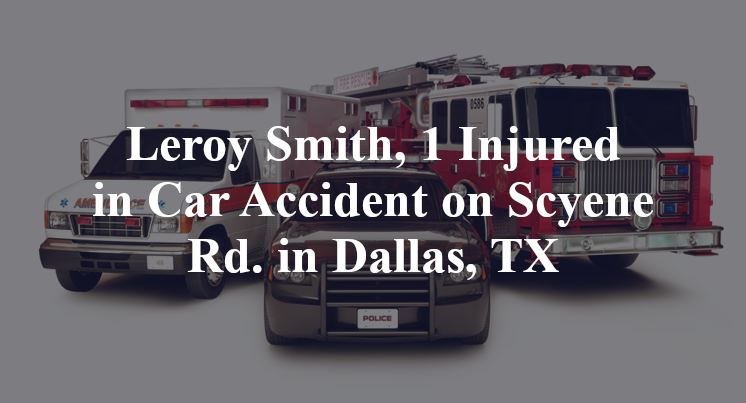Leroy Smith, 1 Injured in Car Accident on Scyene Rd. in Dallas, TX
Dallas County, TX — July 7, 2024, Leroy Smith and another person were injured due to a car accident just after 4:30 p.m. along Scyene Road.
According to authorities, three people—a 57-year-old woman who was driving, 61-year-old Leroy Smith, and a 39-year-old man—were traveling in an eastbound Nissan Maxima on Scyene Road at the Dixon Avenue intersection when the accident took place.

Officials indicate that, for as yet unknown reasons, a westbound Toyota Camry attempted a left turn onto Dixon at an apparently unsafe time, failing to yield the right-of-way to oncoming traffic. A collision consequently occurred between the front-left of the Maxima and the front-end of the Camry.
Smith reportedly sustained serious injuries over the course of the accident. The 39-year-old who had also been a passenger in the Maxima suffered minor injuries, as well, reports state. They were each transported to local medical facilities by EMS in order to receive necessary treatment. Additional details pertaining to this incident are not available at this point in time.
Commentary by Attorney Michael Grossman
Left-turn collisions are among the most common urban crash types, yet they often get treated as cut-and-dry failures to yield. But when someone suffers serious injuries, it’s worth asking whether investigators looked beyond the obvious to understand how it all unfolded.
Did the authorities thoroughly investigate the crash?
For a turn like this to result in a serious injury, something went wrong beyond bad timing. Investigators should have measured where each vehicle was in relation to the intersection, how long the signal phase had been active (if applicable), and whether either driver had a chance to avoid the impact. If those details weren’t mapped or reconstructed, then there’s a real possibility that the report relies too heavily on assumption.
Has anyone looked into the possibility that a vehicle defect caused the crash?
A hesitation in the Camry’s acceleration, a delay in steering response, or a misjudged turn from a malfunctioning power assist system could explain a poor left-turn execution. Likewise, if the Maxima’s safety systems—such as pre-collision braking or alerts—didn’t function as intended, that could have affected how the driver reacted. It’s not enough to say someone turned too soon; both vehicles need to be examined to rule out technical issues.
Has all the electronic data relating to the crash been collected?
Crash modules from both vehicles could show exact speeds, throttle and brake use, and whether the turning car was moving slowly or aggressively. That data helps clarify whether the turn was rushed or if the oncoming car closed the gap faster than expected. In areas with high traffic density, even a few mph difference can change the outcome. If no one pulled that data, critical evidence may already be gone.
A serious injury in a straightforward crash still deserves a serious investigation. Oversimplifying the cause doesn’t make anyone safer.
Takeaways:
- Left-turn crashes demand detailed scene reconstruction to confirm timing and driver reactions.
- Faulty vehicle systems may have contributed and require mechanical review.
- Event data and vehicle telemetry can pinpoint actions and help explain why the crash wasn’t avoided.

*We appreciate your feedback and welcome anyone to comment on our blog entries, however all visitor blog comments must be approved by the site moderator prior to showing live on the site. By submitting a blog comment you acknowledge that your post may appear live on the site for any visitors to see, pending moderator approval. The operators of this site are not responsible for the accuracy or content of the comments made by site visitors. By submitting a comment, blog post, or email to this site you acknowledge that you may receive a response with regard to your questions or concerns. If you contact Grossman Law Offices using this online form, your message will not create an attorney-client relationship and will not necessarily be treated as privileged or confidential! You should not send sensitive or confidential information via the Internet. Since the Internet is not necessarily a secure environment, it is not possible to ensure that your message sent via the Internet might be kept secure and confidential. When you fill out a contact or comment form, send us an email directly, initiate a chat session or call us, you acknowledge we may use your contact information to communicate with you in the future for marketing purposes, but such marketing will always be done in an ethical way.